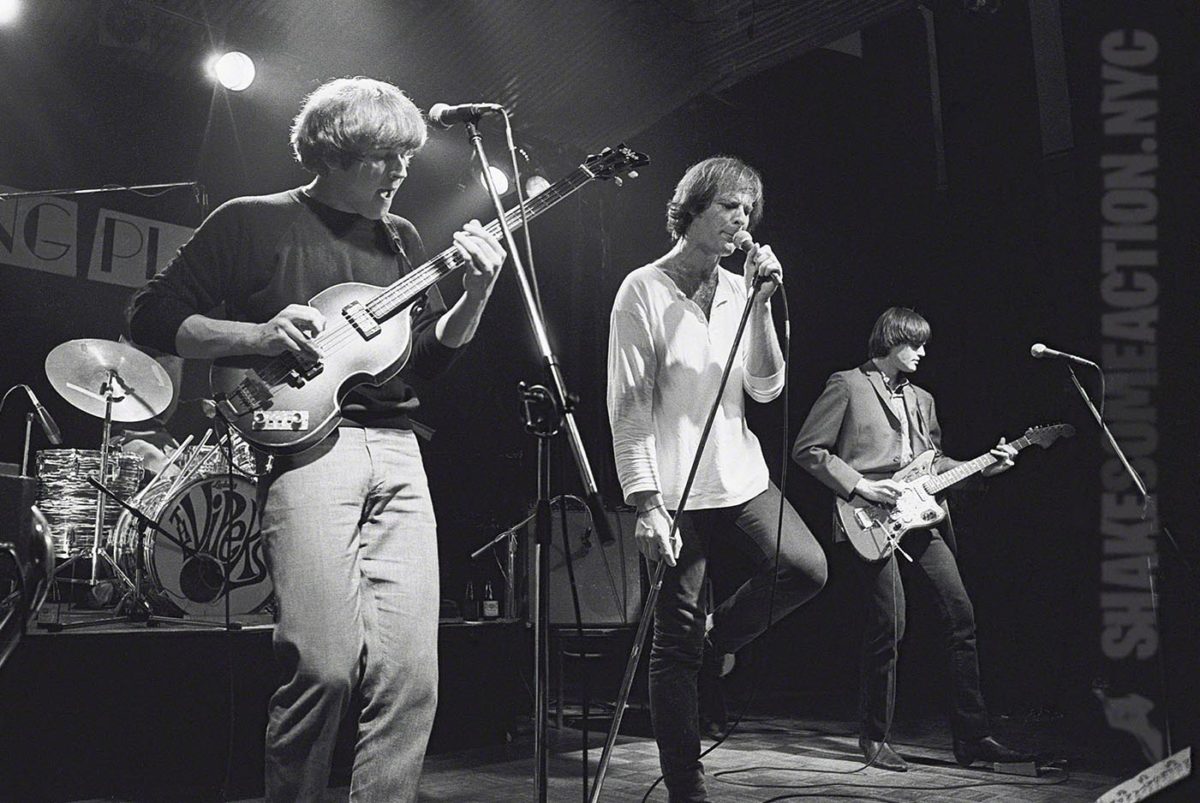NYC’s Vipers saga can easily fill an entire book. Caught in the tumult of the early 80s garage scene, the band forged a solid reputation of delivering incredible live performances matched with stellar songwriting. A talent that not surprisingly brought them to the very brink of national recognition. However, in a moment that could have been lifted straight out of an episode of Behind the Music, the sudden passing of their manager set off a chain reaction that slowly ate away at the band. The Vipers limped along for a few more years, but disagreements, dissatisfaction, and a hard-living 80s lifestyle took a predictable toll. Eventually, the members all went their separate ways.
While The Vipers catalog has always been available in some form or another, it was only in recent years that guitarist Paul Martin took it upon himself to remix and remaster much of the original material so that it better represented the band. Among one of his first projects was to properly release material from the sloppily mixed, cassette-only Cryptic Vaults/Not So Pretty, Not So New.
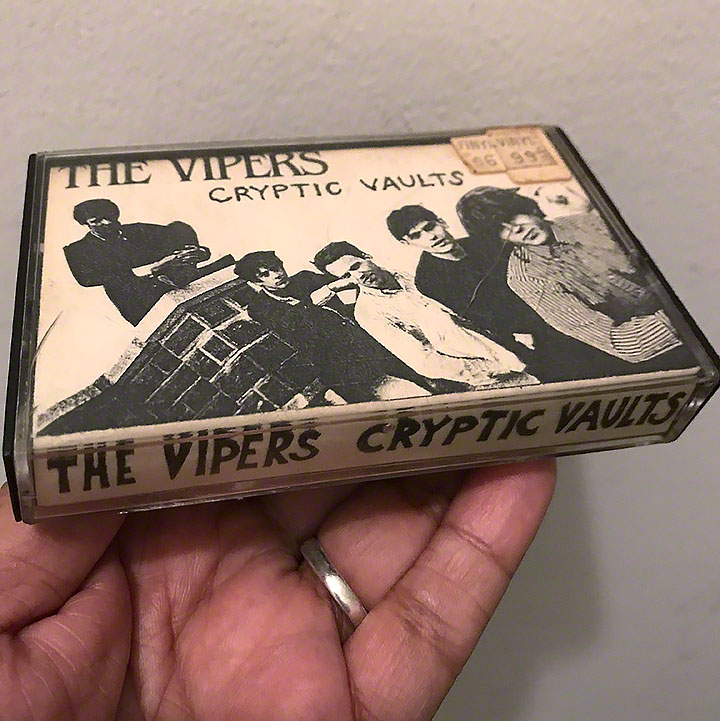
Teaming up with label owner (and former vocalist of 80s Long Island surf-punk band Immortal Primitives) Bob Cantillo, this year saw the release of the first 45 of “new” Vipers material in over 30 years. “Pretty Lies” (as well as the flip, “Find Another”) is a classic example of a hungry garage band at the height of their powers. Sounding closer to their rough live sound than the full-length platters, the single is an astounding reminder of the talent of the early band and makes an essential addition to The Vipers discography.
Curious to hear more about the time period that the demos spanned, I asked Paul Martin to shed some light on the journey.
ShakeSomeAction: Thanks Paul for taking a while to talk about the release. I’m actually amazed that these tapes survived and sound as amazing as they do. Kudos on a great job.
Paul Martin: Well, thank you!
SSA: So, how did this project begin?
P.M.: In retrospect, it was quite a stroke of luck that, in late 2019, I suddenly decided that I wanted to work on these tapes. One day I just packed a suitcase full of reel-to-reel tapes, jumped on a plane, and carried them with me back to New York City (making sure to tell security to not pass it through the metal detectors!). Upon arriving, I left them with my friend, Paul Antonell in Rhinebeck, NY, who owns an amazing studio. Then, much to everyone’s surprise, the pandemic hit. While it made life incredibly difficult for many, in a weird way it allowed Paul the time to bake the tapes, transfer them from plastic to metal reels and then digitize them. After all was said and done, we had a great starting point to do a lot of stuff.
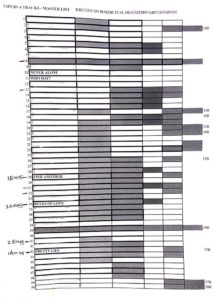
I then passed the digitized files over to Vipers guitarist David Mann, who now lives in Sweden but has a ton of recording equipment he’s collected through the years. He ended up doing all the technical work. I would listen to his work, review it and then just get back to him with my commentary of what else needs to be done. It was a funny process of him saying, “Oh, I can’t do that,” and me following up with, “Well, then try doing this.” The whole idea being to try to get the sound as good as possible. Together, we were able to overcome a lot of limitations and find workarounds that pleased both of us.
I don’t know how many people know this, but a lot of the stuff that we officially released was recorded in our rehearsal studio, The Nest. Our room just had the basics: a simple mixing board, microphones, and a reverb unit. That was about it! So while it was useful for making cassettes to review, we couldn’t really listen to the playback critically there. So, that’s kind of what we’re doing now: taking the original 4-track demos but working on them in a proper studio.
SSA: How did you arrive at the idea of starting these releases with “Pretty Lies” and “Find Another”?
PM: Actually, no particular reason other than they’re both originals and were never properly released anywhere. We did start off with four completed songs. The previously mentioned two plus “In Our Own Time” and “Gonna Laugh Right In Your Face.” What I told Bob Cantillo was to just pick the two you like the best for the 45. So, out of those four, “Pretty Lies” and “Find Another” were the two he liked the best! He also liked “Gonna Laugh Right In Your Face,” but I suggested it’d be better if we didn’t do two tracks with guitar solos. It’d be nice to have one that has a harmonica and organ and the other one a guitar solo for variety’s sake.
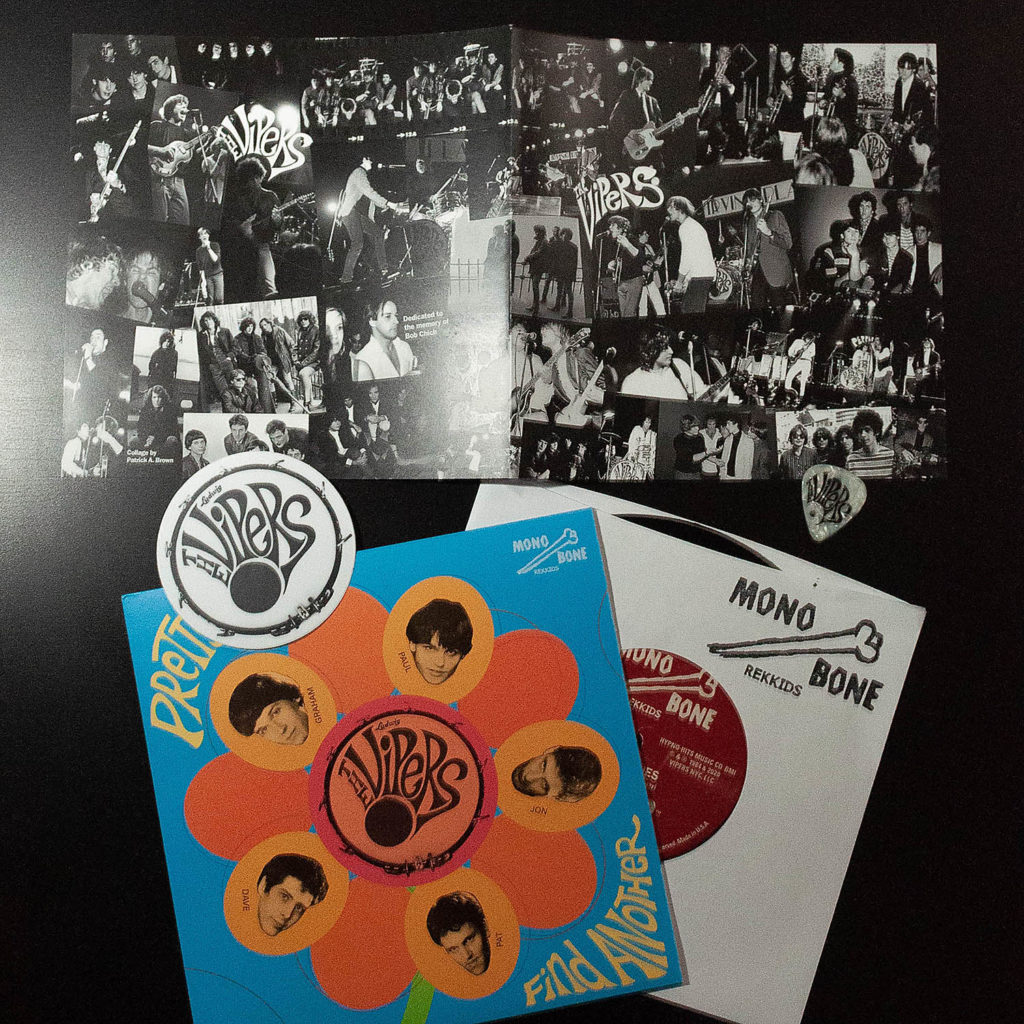
We’re working on a second one now. “Rules of Love” was always a favorite at our shows and something we just never got around to doing in a way that was satisfying. The version on our second album is a very different kind of arrangement than the demo version we’re releasing.
SSA: Any plan for a collection of these demos on an EP or album?
PM: Bob likes just doing 45s, so I’m fine with that. However, Italy’s Misty Lane Records, owned by a fellow named Massimo del Pozzo, is re-releasing Out of the Nest with four extra songs on it. I just sent him everything that I had for the extra songs along with some photographs and things. I don’t know if he’s going to use the original artwork or the artwork that I did for my reissue. I just said, you know, “Here, just go for it!” The one thing that we had a difference of opinion on was where to add the extra songs. He preferred adding them at the very end of the B side and splitting the tracks differently. My preference was to have the A-side play through and then have two tracks after 30 seconds of dead air. So that if you just want to listen to the album, you can play the first six songs and flip it over and play the other six songs. Conversely, you can just put the needle down on a visible separation and play it as a two-sided, four-song EP.
SSA: That sounds the best.
PM: It’s like having an EP within an LP! But to be fair, it’s also his project too, and I didn’t want to give him any resistance in him wanting to do his own thing. Besides, I’ve got plenty of other things to deal with.
SSA: What are some of the other things in the works?
PM: We’re also looking to put out other Viper stuff. I had a live album and a completely remixed second album in the can. And then we have 50 or so demos, plus I’ve got at least another 15 tunes that I know of that I haven’t digitized yet. So that’s basically three LPs worth—or a double CD.
SSA: Do you want to put everything out?
PM: I’d like to see all that stuff come out—if it’s worthy. I mean, there are some things I absolutely just don’t like, but this list of 50 songs is all pretty good. Demo versions of Out of the Nest and the How About Some More albums, many of them with different lyrics and completely different arrangements. The performances themselves are better than what we did in the actual studios because we did them right when the songs were hot. We’d write them, rehearse them, and then when they were at the peak of energy, record it.
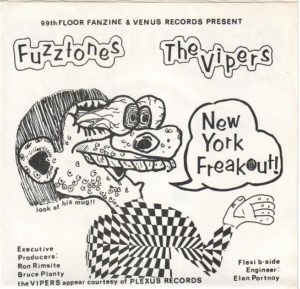
The first Midnight records 45 that we did, “Never Alone,” was also recorded in our rehearsal studio, as well as “Who Dat.”Also, a version of “We’re Outta Here,” released on a Flexi along with Ron Rimsite’s 99th Floor fanzine, was recorded at The Nest. So, it’d be nice to get that stuff out.
SSA: I always found it interesting that the demos came out during a period where things seemed to be at a standstill with the band.
PM: We were working on a second album at the time that was supposed to be called Forbidden Fruit when our manager, Bob Chich, died. That stopped us completely in our tracks and put a damper on the whole project. As we just kind of wanted to move past it, we just kept writing songs and playing shows and stuff like that. We wound up getting another manager named Ray Wilson, who was a nice enough guy, but he didn’t understand the dynamics of the group.
So, it was during that weird time that the demos were released. Our original idea was to make a list of our four tracks, and Cryptic Vaults came from that. It then ended up at Midnight Records who released it as Not So Pretty, Not So New. As their version was essentially a copy of a copy, the sound really wasn’t that great. This is really saying something as the original release was pretty rough to begin with!
So, I wanted to have an opportunity to make it sound good. And, it sounds fantastic! Way better than Out of the Nest. So, I’m excited about those tracks coming out sometime in the future.
SSA: Just out of curiosity, what was the first demo The Vipers ever did as band?
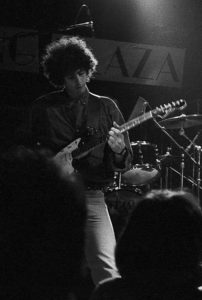
PM: Oh, that was “A Hundred Times A Day,” which came out on Cryptic Vaults along with “When Our Turn Comes.” It was me, Jon, and Graham May, along with a guy named John Flynn, who went by the pseudonym Johnny Decal, on drums. At that time we were sharing a rehearsal space with The Fleshtones in the Music Building. This is incidentally how we met David Mann. He was in Richard Lloyd’s band and was seriously not happy having to cover the rent for Richard who was in a really bad stage in his life at that time. David joined us and The Nest was born.
And, David’s definitely good. I mean, with Richard, he was playing bass, but he’s skilled in many instruments. The first thing we had David play on was the song “Dark is my Day.” That’s him playing bass on that song with Graham and me on guitars. And since David could play keyboards and guitars as well, we were able to switch instruments around depending on who came up with the best line for whatever instrument on any given song. It gave us more variety in how things sounded. With David moving between guitar and organ and Jon playing tenor sax, we were able to do everything from surf music to The Sonics and even Paul Revere and the Raiders live.
SSA: Do you have any good anecdotes about that time?
P.M: The live gigs were really the highlights for us. Do you remember The Cynics out of Pittsburgh? Well, whenever they were in New York, we’d do shows with them. And in return, they would have us come up to Pittsburgh and do shows with them over there. There was a really cool club there called the Electric Banana that was always a blast to play in. Also, in the summertime, Pittsburgh would also have these party boats that navigated the Three Rivers. We played these party boats in which you’d have a Beatles cover band decked out with mop tops in one part of the ship and us playing in a totally different part of the ship! It was so much fun doing those kinds of shows as we got to hang out and meet lots of fun people.
We did some really cool shows. One I remember was in Washington D.C. with Chris Stamey and Alex Chilton. I really liked his pre-dBs 45 that they did together on Ork Records, “Summer Sun.” So hanging out and doing shows with them was really amazing. I really dug that.
We also did this university tour opening up for The Ramones. And (laughs) Joey says to me, “Look, Johnny doesn’t like you guys. He thinks you’re too good. So, you know, he wants to throw you off the tour.” My reaction was, “Whatever (laughs), it’s OK Joey.” He was so relieved: “I’m so glad I can talk to you about it.” So, we wind up doing one show with The Ramones (laughs). And while it was regrettable, it wasn’t our tour, so you sort of had to play by their rules.
Out of all of the Ramones, Tommy was my favorite. And, and he was actually an amazing recording engineer too. But, he wasn’t playing by that time. I think they had already switched to Mark Bell. But, he was there that day we opened. I forget where it was, maybe New Haven? When I went backstage to say hi, Johnny was, like, shooting daggers at me, with a “What the fuck are you doing here?” expression. And then Tommy would come out and go, “Oh, yeah, he’s in a mood.” (laughs) Johnny really hated me for some reason, I’ll never know why. But, my fondest memories are going out to Curry Mahal on Second Avenue to have dinner with Joey. During those earlier CBs gigs, I also got to know Tommy pretty well too. Dee Dee was always out to lunch—but, Joey and Tommy were always really thoughtful.
I was hoping it would work out playing with The Ramones, but it was still a lot of fun. We worked up the crowd and got them to a good place for when The Ramones got onstage. Overall, everybody said it was a real success. So, you take what you can get, you know? But those were the fun parts of that particular time.
SSA: It really seems that Bob’s death really threw things into a tailspin. How did you meet him?
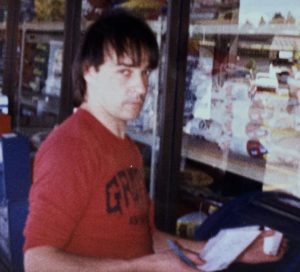
PM: Bob was a manager at the Rocks In Your Head record store on Prince Street, around the corner from West Broadway. That’s how we got to know him. He was a big early proponent of The Vipers. He was coming down to the shows and telling others how great we were. We even started meeting all his friends! One day he just said, “Well, you know, I might as well just manage you fuckers.” (laughs) But, despite the haphazard way we brought him on, it actually worked out for us. Having a manager that really liked the band and got along with all the guys was really indispensable after a certain point. Before Chich came along, Graham’s girlfriend, Debbon Ayer, was our manager. Although she was more interested in being an actress and working on Broadway, the whole publicity and playing clubs and getting-gigs hustle was sort of up her alley as well. My thinking at the time was that her experience in the theater world was a plus. Hey, that’s what Brian Epstein did, right? And like Epstein, she was a proponent of having a “look” when you go on stage. No jeans and T-shirts kind of thing, just have good boots and good suits. So, while she got us in a good place, it quickly became more than she could handle. To her credit, The Vipers by this point were cruising along. So much so that it was easy to transfer the management to Chich. The mailing list, contacts, everything. And she was very happy to do that.
Yeah, so that was pretty seamless. And then Bob just took it to another level. I mean, had he survived, he probably would have had a major record contract for us. Even right up to the end he kept saying, “Man, you know, Sire wants you, and Warner Brothers wants you, and Epic Records wants you. I’m just trying to play them off each other to get a better deal.” I said, “OK, but don’t wait too long.” So he’s trying to work out a deal for us, and then boom, he’s gone. And it wasn’t the kind of thing we could carry on with since he hadn’t really discussed it in detail with us. He just gave us an overview of how things were going, and we just trusted him enough to know that he would do the best he can. And then all of a sudden the bottom dropped out, and we were left with this big hole in our lives. That was pretty much the beginning of the end. But as we were still on an upward trajectory in our careers, we decided to play it out. Especially since we were still young enough to take that kind of risk.
SSA: It’s an incredible story, Paul. Thanks for taking some time to give us a bit of background on the atmosphere surrounding the initial release of the demos.
The Pretty Lies b/w Find Another 7″ is available NOW from Bob Cantillo at Mono-Bone Records. Contact him here for more info: nybob@me.com

